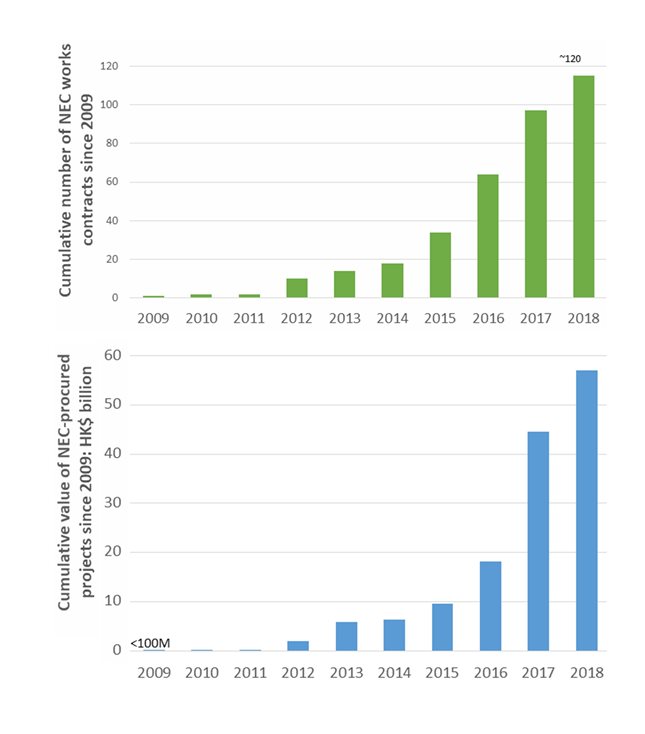
Hong Kong has long been a utopia for civil and structural engineers. The pace of infrastructure development has not slowed since the 1970s, evidenced by continuing rapid development of highway and metro networks, the HK$160 billion (£16 billion) airport core programme and other major infrastructure projects.
The last few months have been particularly significant in Hong Kong’s unique infrastructure history. In September 2018 we saw the commissioning of the HK$84 billion (£8.4 billion) Hong Kong section of the Guangzhou− Shenzhen−Hong Kong Express Rail Link, followed in October by the Hong Kong−Zhuhai−Macao Bridge project, to which Hong Kong contributed around HK$70 billion (£7 billion) funding. Together these mega-projects opened a new chapter in our cross-boundary transport links, enhancing connectivity to the mainland’s Greater Bay Area and national highspeed rail network.
Last month we also opened the HK$36 billion (£3.6 billion) Central−Wanchai Bypass, greatly relieving the long-standing traffic problems along the northern shore of Hong Kong island. These three outstanding projects will further enhance the Hong Kong construction industry’s track record for delivering world-class infrastructure.
Cultural change
However, despite its proud record, the industry has come under increasing pressure and scrutiny in recent years as a result of delays, cost overruns, productivity problems and accidents. The industry needs to act together to perform better, hence the launch of our Construction 2.0 − Time to Change campaign in September 2018.
Looking ahead, we expect Hong Kong’s annual construction output to increase to over HK$300 billion (£30 billion) over the next few years. Hundreds of new construction projects – ranging from public and private housing developments to land supply initiatives, new town projects and hospital schemes − are in the pipeline. But we need a more productive, more professional and higher quality construction industry to help us build a better Hong Kong, which means we need to instil a new culture in the industry.
We have already started driving culture change by making the NEC suite of contracts our default procurement mechanism for public works projects since 2016. NEC contracts encourage collaboration by focusing project teams on project objectives, enabling co-ownership of budget and programme, and facilitating early resolution of disputes.
A decade of NEC
Since our first NEC pilot project in 2009, the Development Bureau has been working with its works departments to implement the NEC suite across all works procurement, including land supply, buildings, highways, drainage and sewerage, water supply, electrical and mechanical works, geotechnical works, and operation and maintenance. We have also encouraged active participation of our consultants and contractors to accumulate NEC expertise and experience.
There are now around 100 NEC-procured works contracts underway and a further 20 completed, representing a total NEC-procured value of about HK$60 billion (£6 billion), as well as 20 NEC-procured consultancy agreements (see charts below). Going forwards, we are striving to deliver more building projects with NEC contracts in the coming years.
For large and complex projects, we see the advantages of adopting NEC’s target-cost approach in terms of improved risk allocation and better cost transparency. We have already piloted the open-book NEC3 Engineering and Construction Contract Option C (target contract with activity schedule) in several largerscale projects, such as the Cross Bay Link at Tseung Kwan O and Happy Valley underground stormwater storage scheme.
NEC4 and BIM
Following the launch of NEC4 in 2017, we are currently planning a progressive transition from NEC3 to NEC4 contracts to enhance collaborative partnering, unlock innovations and achieve better cost management and value for money in public works.
Also, to overcome labour shortages and boost productivity, we are actively seeking to integrate building information modelling (BIM) technology into all our construction projects, which will synergise with modular and off-site construction methods. Since 2018 we have required all our consultants and contractors to use BIM when undertaking design for major public works projects.
The introduction of secondary option clause X10 on information modelling in NEC4 contracts is a timely match with our new policy. We believe BIM will act as an effective collaboration platform across the integrated project team, enhancing both buildability and productivity under NEC contracts.
Early contractor invovlement
To unlock innovation further, the Development Bureau is additionally exploring how to introduce early contractor involvement on NEC contracts and the benefits of buildability and cost efficiency this brings to the design process. There are challenges in maintaining a fair, competitive and open bidding system but I am confident we will resolve the details of the two-stage involvement and enhancement process.
Overall, I believe by working closely with our works departments, contractors and consultants − and by increasing use of NEC contracts − we can develop a new collaborative partnership culture in our construction industry and continue to build a better Hong Kong.





